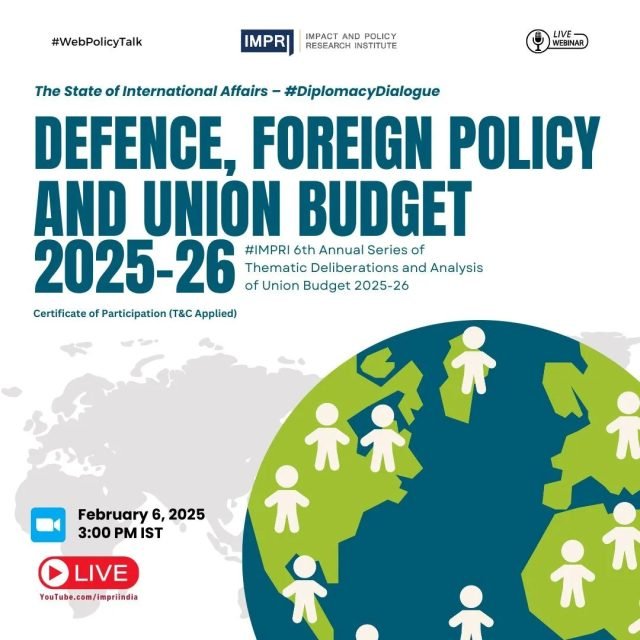Event Report
Avi Sharma
IMPRI Center for International Relations and Strategic Studies (CIRSS), IMPRI Impact and Policy Research Institute, New Delhi, organized a panel discussion on Defence, Foreign Policy, and Union Budget 2025-26 as part of its #WebPolicyTalk series. The event was a key session in IMPRI’s 6th Annual Series of Thematic Deliberations and Analysis of Union Budget 2025-26, bringing together experts to discuss the budget’s implications for defence and foreign policy.
Opening Remarks: Dr Simi Mehta
The session was chaired by Dr Simi Mehta, CEO and Editorial Director of IMPRI. She highlighted the significance of the Union Budget in shaping India’s defense and foreign policy, particularly in achieving the vision of a developed India by 2047. Dr Mehta emphasized the necessity of understanding budget allocations to the Ministry of Defense and the Ministry of External Affairs, especially in the context of India’s immediate neighborhood and its growing global influence.
Presentation by Avi Sharma
The discussion began with a presentation by Avi Sharma, a research intern at IMPRI. She provided an overview of the defense budget, noting an allocation of ₹6.81 lakh crore, marking a 9.5% increase from the previous year. Sharma highlighted key focus areas such as defense modernization, self-reliance, and significant investment in domestic procurement, emphasizing that 75% of the modernization budget would support local manufacturers. She also touched upon the foreign policy budget, which saw an allocation of ₹20,516 crore, reflecting a commitment to India’s ‘Neighborhood First’ policy, particularly aimed at infrastructure projects in neighboring countries.
Initial Remarks: Major General P. K. Chakrawarti
Major General Chakrawarti, VSM (Retd), Strategic Thinker on Security Issues; Visiting Senior Fellow, IMPRI, underscored the importance of reforming defense procurement processes to ensure that allocated funds are effectively utilized, cautioning against bureaucratic hurdles that hinder timely spending. He pointed out that while defense spending remains around 1.9% of GDP, a target of 3% is more appropriate given India’s security challenges. He also noted the remarkable growth of India’s defense exports, which could potentially enhance the domestic industry if given a level playing field.
Comments by Professor Annpurna Nautiyal
Prof Annpurna Nautiyal, Vice Chancellor, Hemvati Nandan Bahuguna Garhwal University, Uttarakhand emphasized the interplay between defense and foreign policy, asserting that they are complementary rather than opposing forces. She pointed out the need for a robust domestic economy to support national security goals while advocating for innovation in defense technologies. Nal highlighted the importance of India’s ‘Make in India’ initiative to ensure self-reliance in defense manufacturing.
Insights from Professor Naval Paswan
Professor Naval Paswan, Professor, Department of Peace and Conflict Studies and Management, Sikkim University elaborated on the defense budget’s focus on modernization and the need for significant allocations towards research and development. He highlighted the necessity of improving border infrastructure and technological advancements to maintain strategic readiness. Paswan stressed the importance of increasing the defense budget to at least 2.5% of GDP to address India’s unique security needs.
Discussion with Professor Prabir De
Professor Prabir De, Professor, Research and Information Systems for Developing Countries (RIS), New Delhi provided insights into the broader economic implications of the budget, noting that while the defense budget is crucial, India must balance its spending with domestic growth initiatives to achieve long-term objectives. He emphasized the need for strategic resource allocation to enhance India’s global standing.
Concluding Remarks: Professor Swaran Singh
Professor Swaran Singh, Professor and Chairperson, Centre for International Politics, Organization and Disarmament (CIPOD), Jawaharlal Nehru University (JNU), New Delhi concluded the discussion by highlighting the significance of India’s diplomatic outreach and its impact on foreign policy. He noted that the Ministry of External Affairs budget is often underfunded compared to the defense budget, which can limit India’s global engagement. Singh called for a more integrated approach to budgeting that aligns defense capabilities with foreign policy objectives.
Acknowledgment: The report was written by Avi Sharma, a Research Intern at IMPRI, who recently completed an MA in International Relations from Symbiosis International University, Pune.
IMPRI’s 6th Annual Series of Thematic Deliberations and Analysis of Union Budget 2025-26
IMPRI’s 6th Annual Series of Thematic Deliberations and Analysis of Interim Union Budget 2025-26
Defence, Foreign Policy and Union Budget 2025-26



















